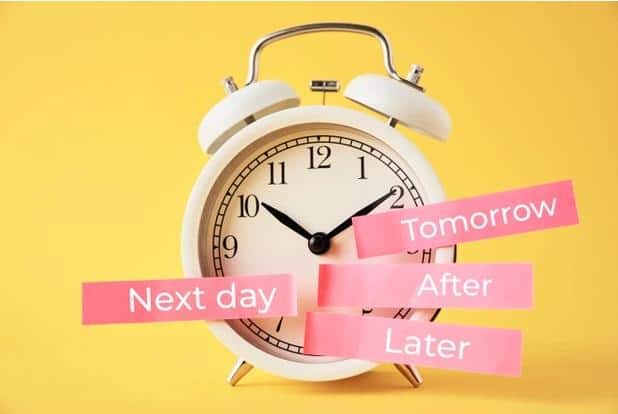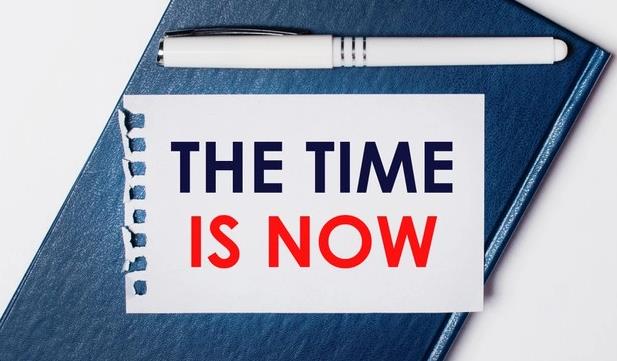All About Procrastination & How To Stop Procrastinating?

On Procrastination:
“You Cannot Escape The Responsibility Of Tomorrow By Evading It Today.”
Abraham Lincoln
A bit later….
Maybe tomorrow…
I don’t have the energy to do it now…
I will finish it when I am in the right mood….
The above are some common sentences we utter to ourselves when we are not in the mood to get something done. Pushing tasks to the last minute is something we all have done at some point in our lives. Though delaying errands occasionally may be acceptable, making it a habit that can make you avoid responsibilities is not. This is procrastination.
When you have goals to achieve and dreams to accomplish, procrastination is not the path to follow. To boost productivity, one needs to learn how to resist procrastination and develop the basic skills of finishing things on time.
Procrastination: What Does It Mean?
So, what is procrastination meaning?
Procrastination is an act of delaying, rescheduling, or postponing tasks deliberately until the deadline is near. People hold up work knowing that it will produce consequences, and in the long run, this impacts their ability to finish stuff effectively and efficiently.
Some Quick Facts On Procrastination
Learn more about procrastinating through these quick, interesting facts!
- Do You Know Procrastination Meaning Askaria?
Ancient Greek Philosophers Socrates and Aristotle introduced procrastinating as Askaria. In ancient times, askaria referred to the inability to have sufficient self-control over an individual’s ability to perform a task or set of assignments. This behavior restricts them from acting against their firm determination to complete a job on time.
- Long-Time Procrastination Effects Mental Health
According to a study conducted by Dr. Ferrari and Diaz Morales, an individual’s physical and mental health gets affected when procrastinating becomes more of a habit. The person becomes stressed, and managing the daily aspect of life becomes challenging for them.
- Procrastination And Laziness Are Not Same
People often confuse and take laziness as a sign of procrastination, but these are two different phenomena altogether. Where procrastination means putting things off until the last moment, laziness is being uninterested in doing any work at all.
A procrastinator will eventually sit down to finish the work at the very last moment to meet the deadline, but you can’t force a lazy person to kick-start something.
Are You Familiar With The Term “Revenge Procrastination?”
Do you remain awake at night aimlessly scrolling down your social media account or watch series after series on Netflix?
If so, you have migrated from the phase of procrastination to Revenge Procrastination. Some people call it Revenge Bedtime Procrastination or Revenge Sleep Procrastination. The term refers to sacrificing the resting hours of the night to enjoy some leisure activities that are otherwise impossible due to the busy schedule.
Bedtime procrastination was introduced in 2014 in a study carried out by behavioral scientist Dr. Floor Kroese. People in China used this “revenge” part with strict working hours with minimum to no time for relaxation.
On the whole, revenge procrastination is a psychological phenomenon where an individual procrastinates their sleep to catch up on some recreational activities. This is to simply feel some control over one’s life even though sleeping and resting might be sacrificed in the process.
Interestingly, about 74% of adults revealed that they go to bed later than their expected sleeping time. Seeing the statistics, it’s pretty clear how people can go to any lengths to get their revenge after all!
Signs To Look Out For:
Signs that indicate you might be suffering from revenge procrastinating include:
- Delaying going to sleep which leads to getting insufficient sleep.
- Staying up late at night for no particular reason.
- Individuals facing this condition are fully aware that this will produce negative outcomes in their daily lives.
Common Reasons Behind Procrastination
“We are so scared of being judged that we look for every reason to procrastinate.”
Erica Jong
Fear of being judged accompanied by lack of motivation and self-discipline are prominent reasons for delaying stuff.
Apart from these primary psychological factors, many other rational reasons cause a person to pile up stuff for tomorrow. The following list will give you a quick review of some significant reasons causing your once motivational self to postpone activities and become a procrastinator.
- Having undefined or vague objectives.
- Lack of interest or not in the mood to finish off stuff.
- Preferring one job over another one.
- Having that optimistic feeling that you can finish at the last moment.
- Feeling overwhelmed with the task at hand.
- Anxiety and distress about how to best handle the work.
- The task or work looks unappealing.
- The fear of failure or mishandling the responsibility forces a person to keep delaying things.
- Often procrastinators suffer from Attention Deficit Hyperactivity Disorder (ADHD) which restricts their ability to focus on a single task.
- Getting indulged in activities that feel welcoming and sound pleasant at the present moment. This causes them to delay things that might bear fruitful results in the future.
Quick Fact: According to a study by Dr. Joseph Ferrari, about 20% of individuals are chronic procrastinators.

Consequences Of Procrastination
Meeting deadlines and finishing tasks promptly is absolutely important. If you want to move ahead, achieve your goals, and grab every opportunity that life throw at you, you need to realize the underlying reason for your procrastinating behavior.
“A year from now, you may wish you had started today.”
Karen Lamb
Smart people know when to take a stand against this deadly enemy. But for those who still believe that occasional procrastination is a safe course of action, we have rounded up some quick reasons informing you about how this “finish the work at the last moment” criteria can adversely affect your productivity.
Wasted Time
Time is money! Keep procrastinating, and you will be regretting how much time you had wasted being idle. When the deadline for submitting a presentation hangs above your head, you will wish that you had taken an early start rather than dancing on Bella Chao airing on Netflix!
Missing Out On Opportunities
Life gifted you an opportunity, and you missed it because you are still contemplating your options. It may be due to low self-esteem and a lack of willingness to get started. Whether it’s due to overthinking or your habit of being a procrastinator, you will miss this once-in-a-lifetime chance. And if you don’t realize it, the cycle will continue, and you will be unable to achieve your goals.
Negative Impact On Mental Health
The stress of submitting work at the last time or delaying an activity that requires your instant attention may cause adverse effects on your mental and physical health.
According to experts, long-term procrastination increases anxiety and depression and gives rise to emotions such as shame, guilt, and frustration. It may also cause sleep insomnia forcing an individual to have a disturbed sleeping cycle. All these psychological effects disturb life significantly.
Life Loses Its Balance
It is your professional or personal life; you should develop a habit of completing stuff precisely on time. Not being able to take action at the right moment will disrupt the balance of your life.
According to a study conducted by Darius Foroux, an average person with a salary of $40k a year wastes about $15000 by procrastinating three times a day.
Studies show that about 80-90% of students engage in procrastinating, which is a significant portion of the academic community. They admit that by being involved in activities such as watching TV, video gaming, and sleeping, they push assignments until the due date approaches, and this disturbs their life.
Now, do you want to know how to not procrastinate?
How To Stop Procrastinating?
Whatever your reasons for being a late bloomer are, you need to stop procrastination now and look for that one factor that can spark positive energy within you. It can be anything that could motivate you to regain your interest in the work that demands your attention.
So, grab a sip of your favorite coffee to clear your mind because here is a quick guide on how to avoid procrastination and achieve more in life.
1. Identify Your Trigger Aspects
To fight procrastination, you need to identify the major catalysts to your behavior. A task is presented to you, and your mind starts working on ideas on how to delay it.
This is when you should look for your trigger points. Is the task tedious, does it seem frustratingly lengthy, or is there no reward at the end of the road?
Once you realize why you are transferring the task to your next day’s to-do list, you will come up with a better plan to cope with the situation.

2. Give It A Brief Start
Moving on to the next step, you need to give it just a brief quick start. Even though you find the task boring or unappealing, force yourself to just give it a moment. It is one of the most intuitive methods of killing procrastinating. As soon as you get indulged in something, you will want to finish it or most probably get over the feeling of delaying it.
3. Go for a Short Break
You might be feeling exhausted or frustrated looking at all that workload. So, make it easier for you. Go for a walk, drink cold coffee at the nearest coffee shop and clear your mind to boost productivity.
4. Break The Task Into Chunks
You get stressed out with an ample amount of work as we see just how much work the entire project requires, we promise to get started the next day.
The key to handle this situation is to break a complex task into smaller easy-to-do jobs. Give each piece of work a set amount of time. This will make the task less intimidating, and you will be able to complete it by utilizing your full potential.
5. Avoid Social Media
The sound of a little “pop” every few seconds notifying you about the next status uploaded by your friend on social media is a significant distraction in your way.
Social platforms are a major source of distraction hindering a person’s ability to reach their optimum capacity. So, disconnect from social media sites to get connected to your work!
6. What Are Your Goals?
What do you intend to achieve? Does the task or activity at hand help you attain your personal or professional goals?
Remember, you have to fight procrastination by coming up with the right motivation technique. Connect your assignment with your future goals and visualize yourself at the end of your success road. This will help you see the bigger picture, and you will feel like giving in your best.
7. What Are Your Productive Hours?
This is a simple yet super-effective tip that can miraculously help you fight procrastination. The mind of every individual works at its optimum capacity during a certain part of the day. Some people are early birds and love to work as soon as the sun goes up. On the other hand, some people generate creative ideas during the dark hours of the night.
In simple words, use your productive hours to your advantage. Try to accomplish tasks and finish projects during those hours. You will be more driven and willing to get things done during your peak hours.
8. Celebrate With A Treat
Lastly, give yourself a small treat every time you successfully resist procrastination. It is similar to the incentives given to employees to inspire them to come up with more innovative ideas. Use the same rule. Grab your favorite snack, go out on dinner and watch your favorite movie; anything to feel rewarded and cheerful.
So, there you have it. Now you know all about procrastination, its consequences, and how to stop procrastinating. Make use of this information to make your life easier and more productive.
Subscribe to our newsletter
